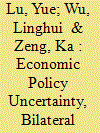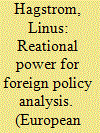|
|
|
Sort Order |
|
|
|
Items / Page
|
|
|
|
|
|
|
| Srl | Item |
| 1 |
ID:
138918


|
|
|
|
|
| Summary/Abstract |
In this article, I develop the multilateralism-through-bilateralism thesis by analyzing Asian bilateral investment treaties (BITs)—the idea that dense networks of bilateral agreements with similar contents provide the architecture for de facto multilateralism in regional economic governance. BIT networks are becoming increasingly dense and converging in content, and hence are analogous to a multilateral architecture for investment governance in the region. Key elements of this process are the degree of density and uniformity of BIT networks. Using the tool of social network analysis, I show that Asian BIT networks have become much denser, and they converge rather than diverge in terms of key provisions such as investment protection and dispute settlement procedures. I suggest that bilateralism is not necessarily a substitute for, or a stumbling block to, multilateralism, but should rather be viewed as another useful path toward multilateral governance.
|
|
|
|
|
|
|
|
|
|
|
|
|
|
|
|
| 2 |
ID:
179935


|
|
|
|
|
| Summary/Abstract |
This paper examines the effect of bilateral investment treaties (BITs) in promoting outward Chinese foreign direct investment (COFDI) in the presence of rising economic policy uncertainty in China’s partner countries. We postulate that the signing of BITs should help stimulate COFDI because the treaties send a credible signal to foreign investors about the host country’s intent to protect Chinese investment, and make it more difficult for the host country to violate its treaty obligations. BITs that contain rigorous investment protection and liberalization provisions, in particular, should be more likely to encourage COFDI as they directly influence Chinese investors’ expectations about the stability, predictability, and security of the host market. However, while BITs generally promote COFDI, host country economic policy uncertainty may also limit their effectiveness. This is because uncertainty tends to undermine investor confidence, trigger capital flows from high- to low-risk countries, and dampen commercial activities. Poisson pseudo-maximum likelihood (PPML) estimation models of the determinants of COFDI to 188 countries between 2003 and 2017 lend substantial support to our conjectures.
|
|
|
|
|
|
|
|
|
|
|
|
|
|
|
|
| 3 |
ID:
139154


|
|
|
|
|
| Summary/Abstract |
An umbrella clause contained in a bilateral investment treaty should be examined from a larger, systemic perspective, instead of a microscopic analysis of whether it enhances the level of protection for foreign investors. In particular, an umbrella clause does not exactly dovetail with some of the basic principles and jurisprudence of public international law. The adoption of an umbrella clause also renders the administration of investment treaties and investment dispute settlement proceedings more complex and difficult to manage. As such, blind adoption and application of an umbrella clause would cause continuing tension and widening rifts in the long run. Viewed from this perspective, the wisdom of having an umbrella clause should be carefully scrutinized from the structural point of view. This realization necessitates the creation of important guidelines for states and investment tribunals concerning the formulation, interpretation and application of an umbrella clause.
|
|
|
|
|
|
|
|
|
|
|
|
|
|
|
|
| 4 |
ID:
066282


|
|
|
| 5 |
ID:
109938


|
|
|
|
|
| Publication |
2011.
|
| Summary/Abstract |
Bilateral investment treaties (BITs), agreements that provide extensive rights and protection to foreign investors, were first adopted in the 1960s, proliferated in the late 1980s and 1990s, especially among developing countries, and seemingly fell out of fashion after 2001. To explain this life cycle of diffusion across the international state system, we argue that BIT signing followed a traditional logic of diffusion for an innovation albeit here in the policy realm. In the first period, BITs provided a solution to the time inconsistency problem facing host governments and foreign investors. In the second period, these treaties became the global standard governing foreign investment. As the density of BITs among peer countries increased, more countries signed them in order to gain legitimacy and acceptance without a full understanding of their costs and competencies. More recently, as the potential legal liabilities involved in BIT signing have become more broadly understood, the pattern of adoption has reverted to a more competitive and rational logic. Our empirical tests of BIT signing over four decades provide evidence for such a three-stage model.
|
|
|
|
|
|
|
|
|
|
|
|
|
|
|
|
|
|
|
|
|